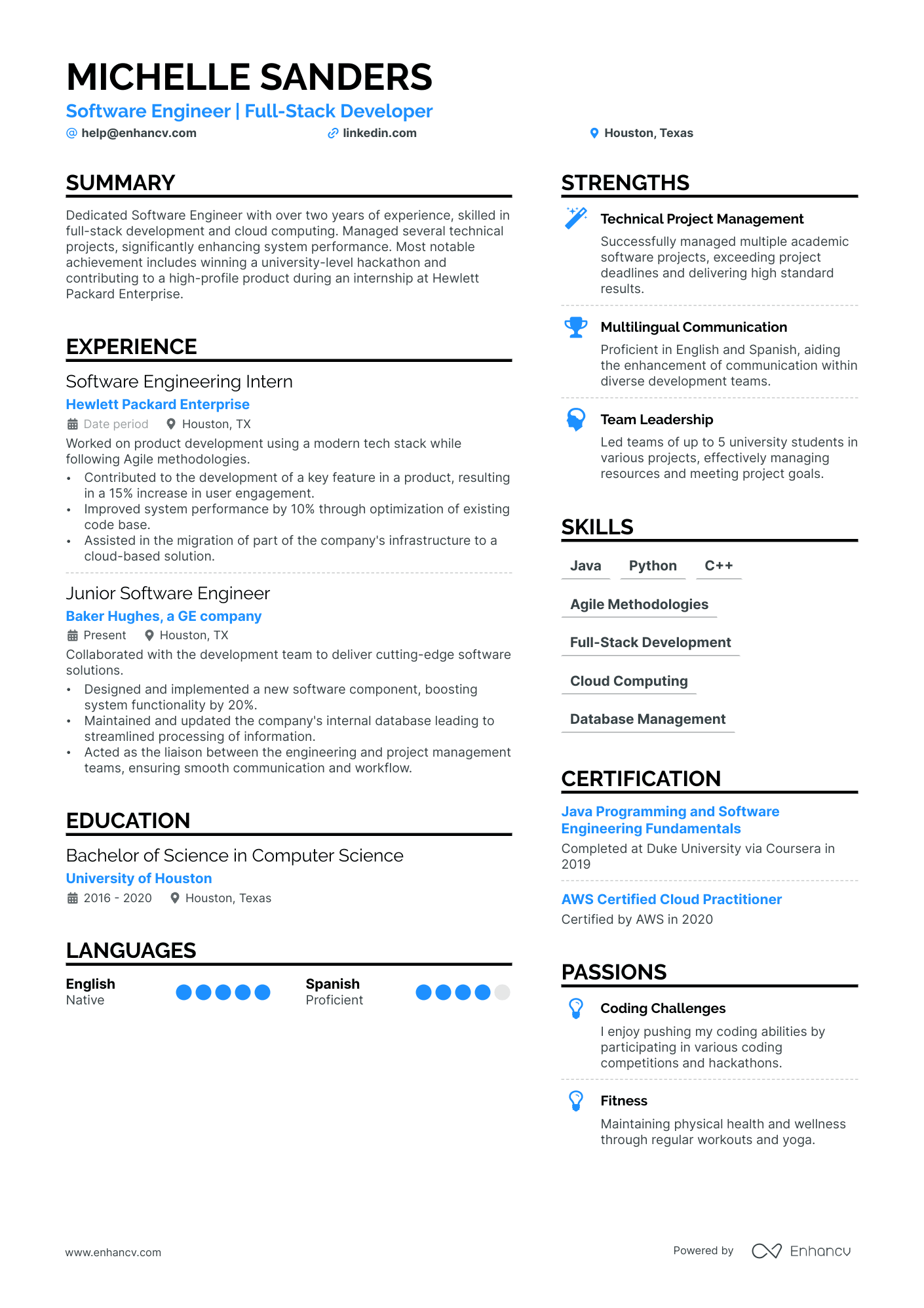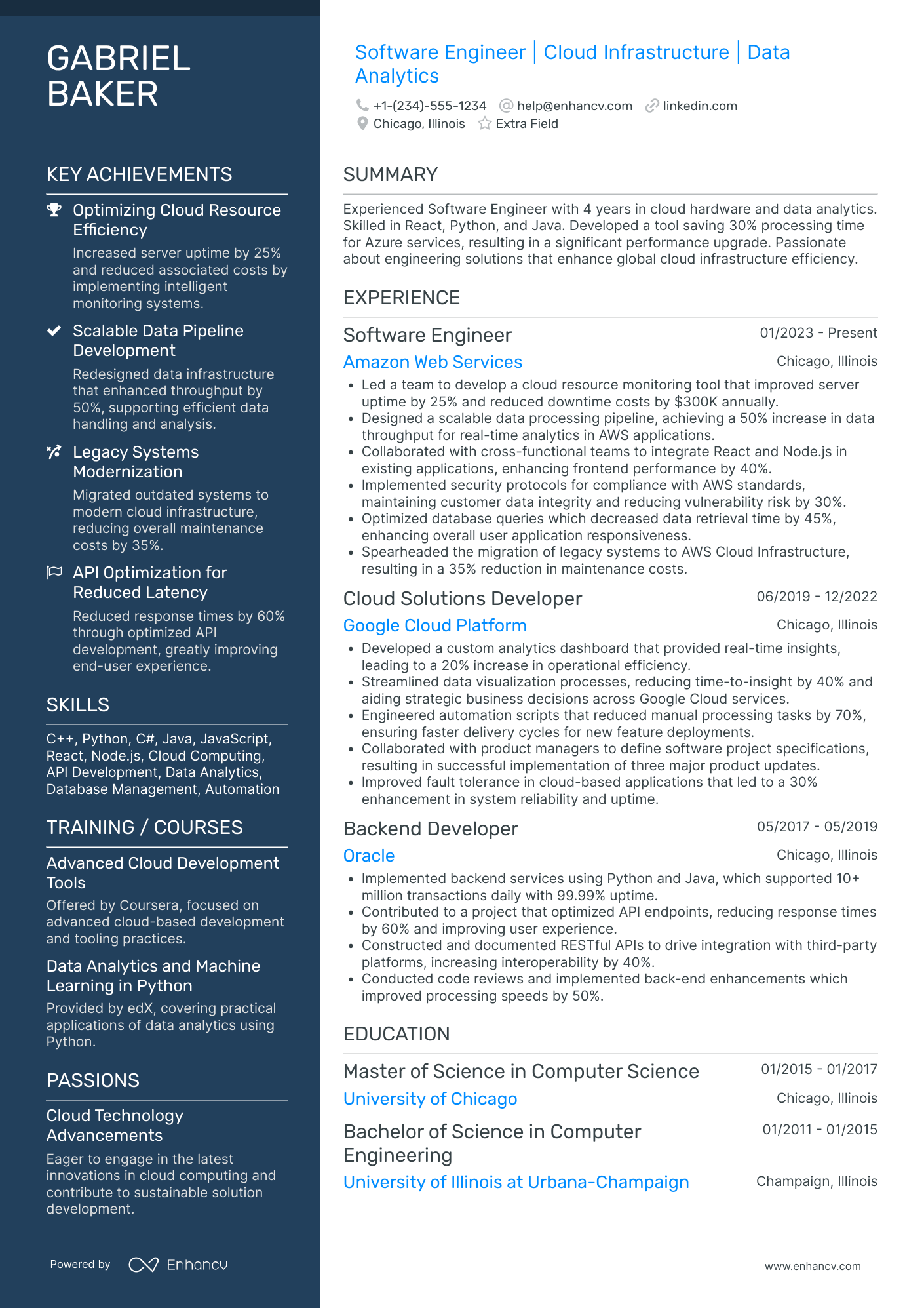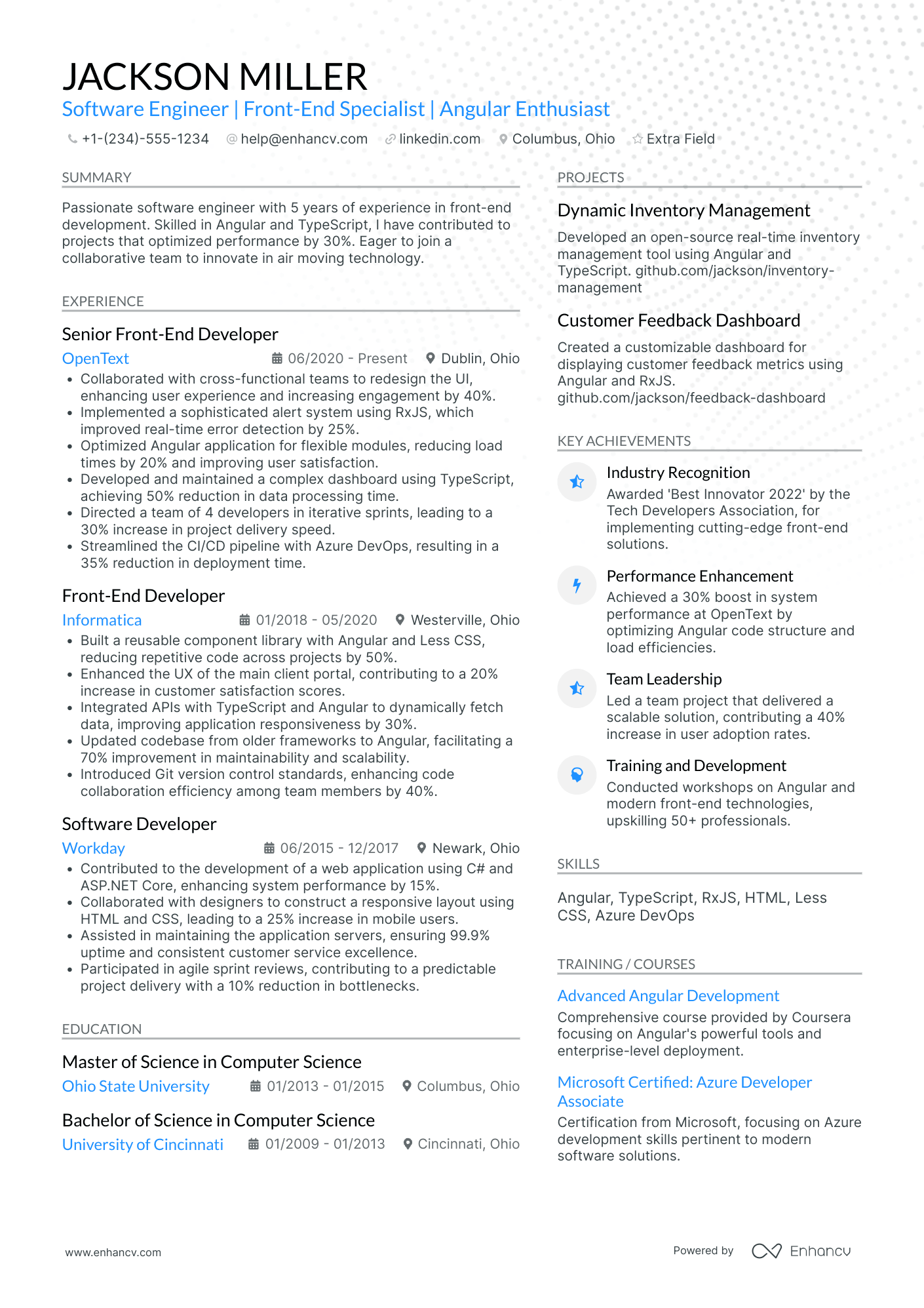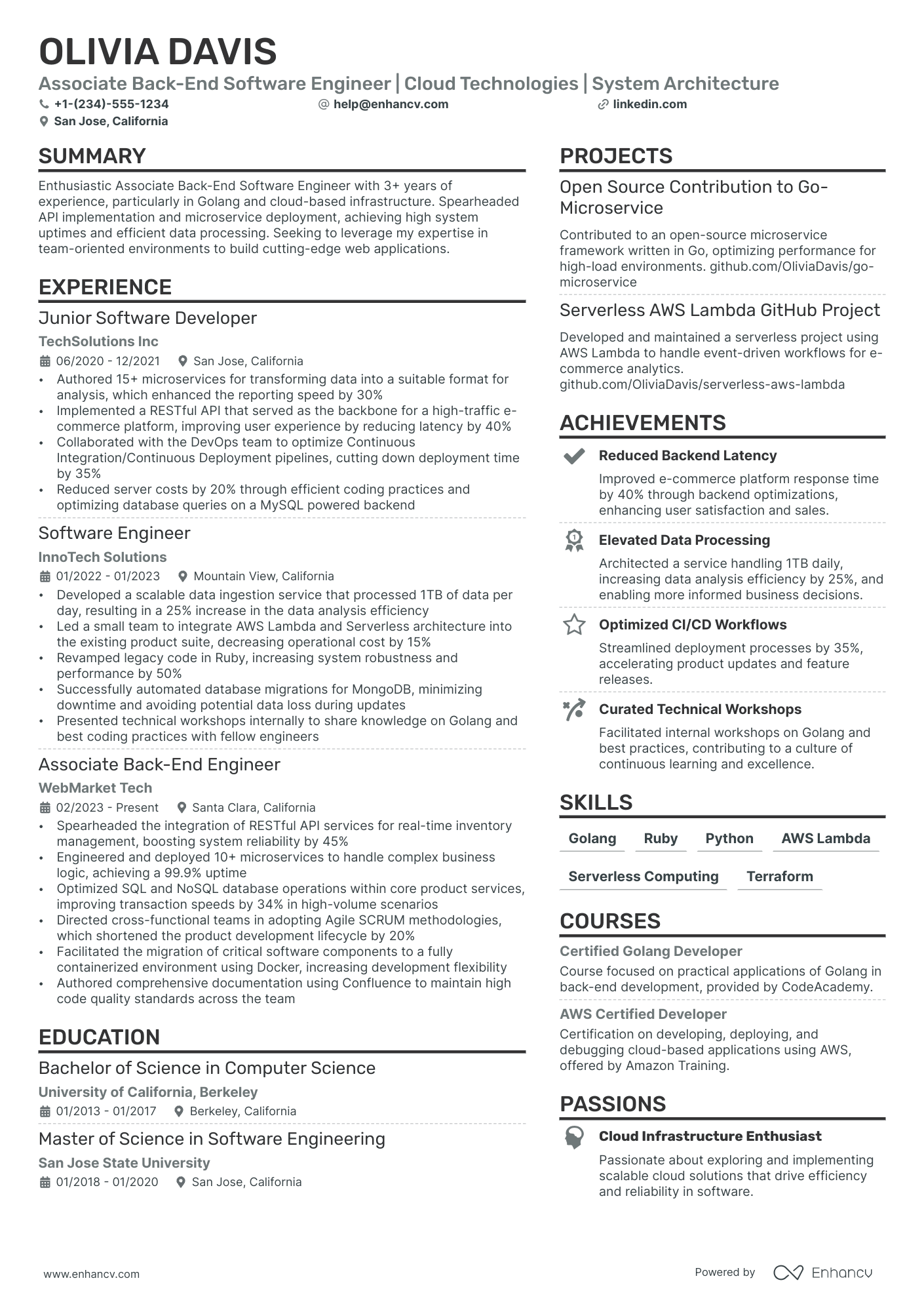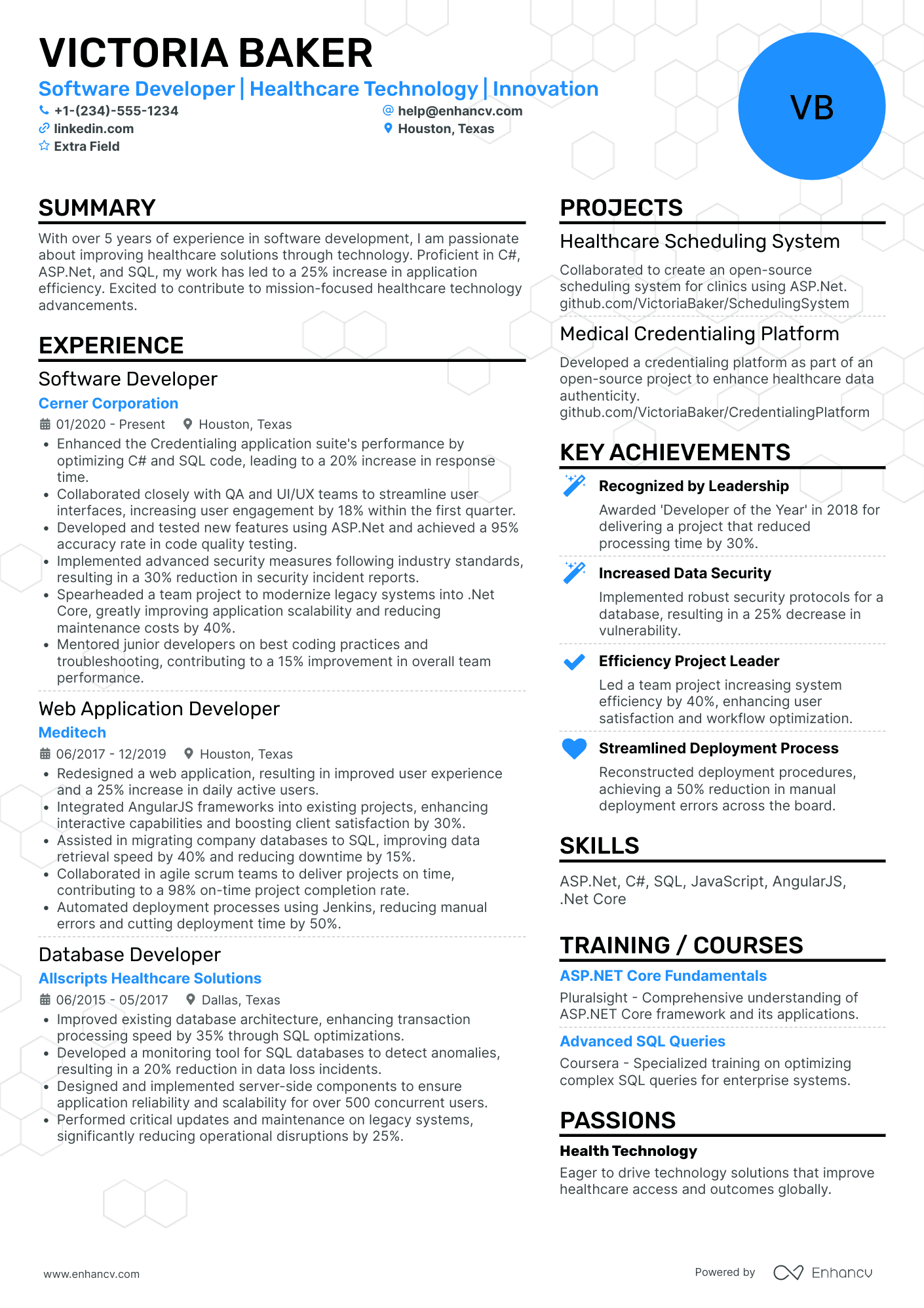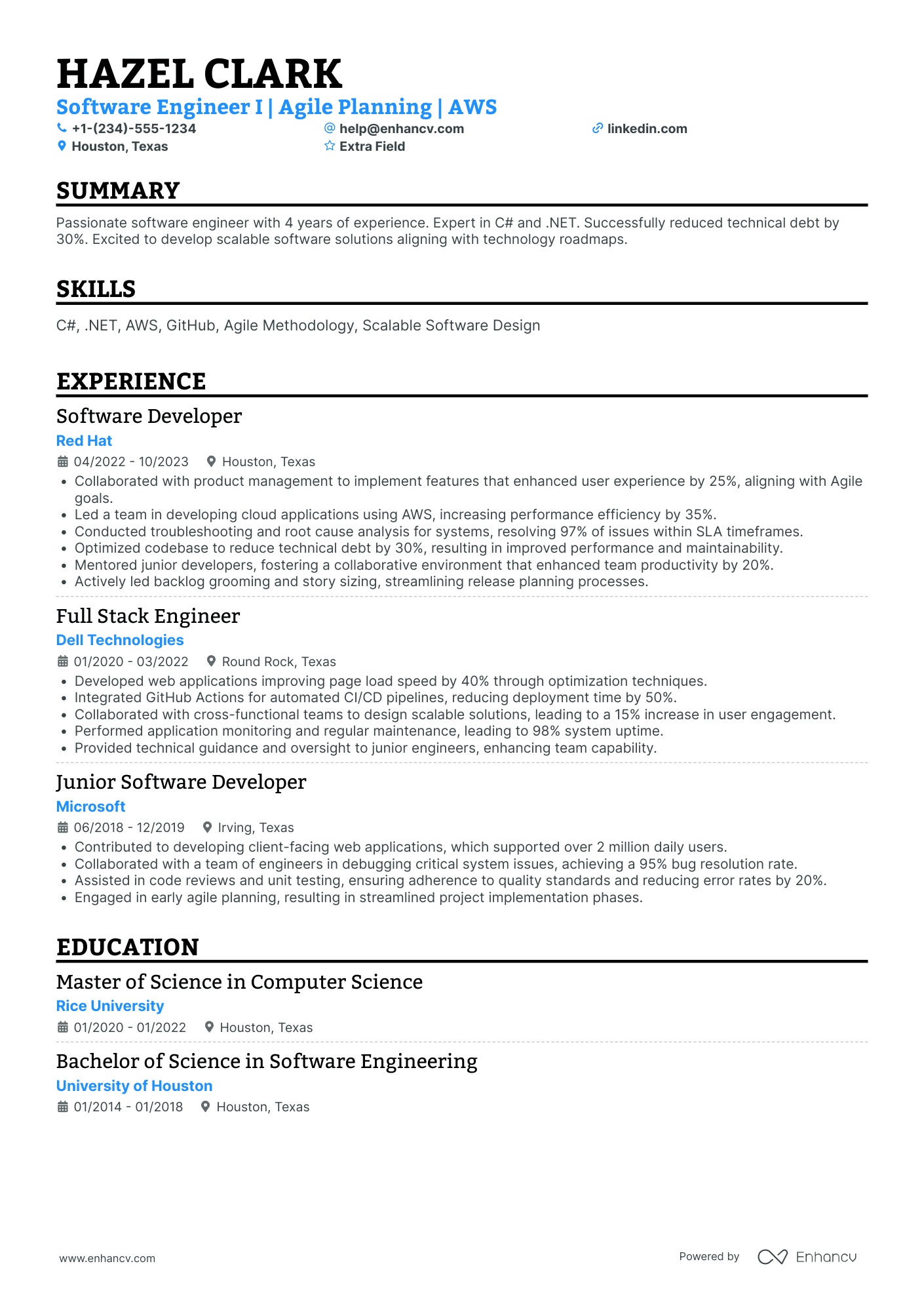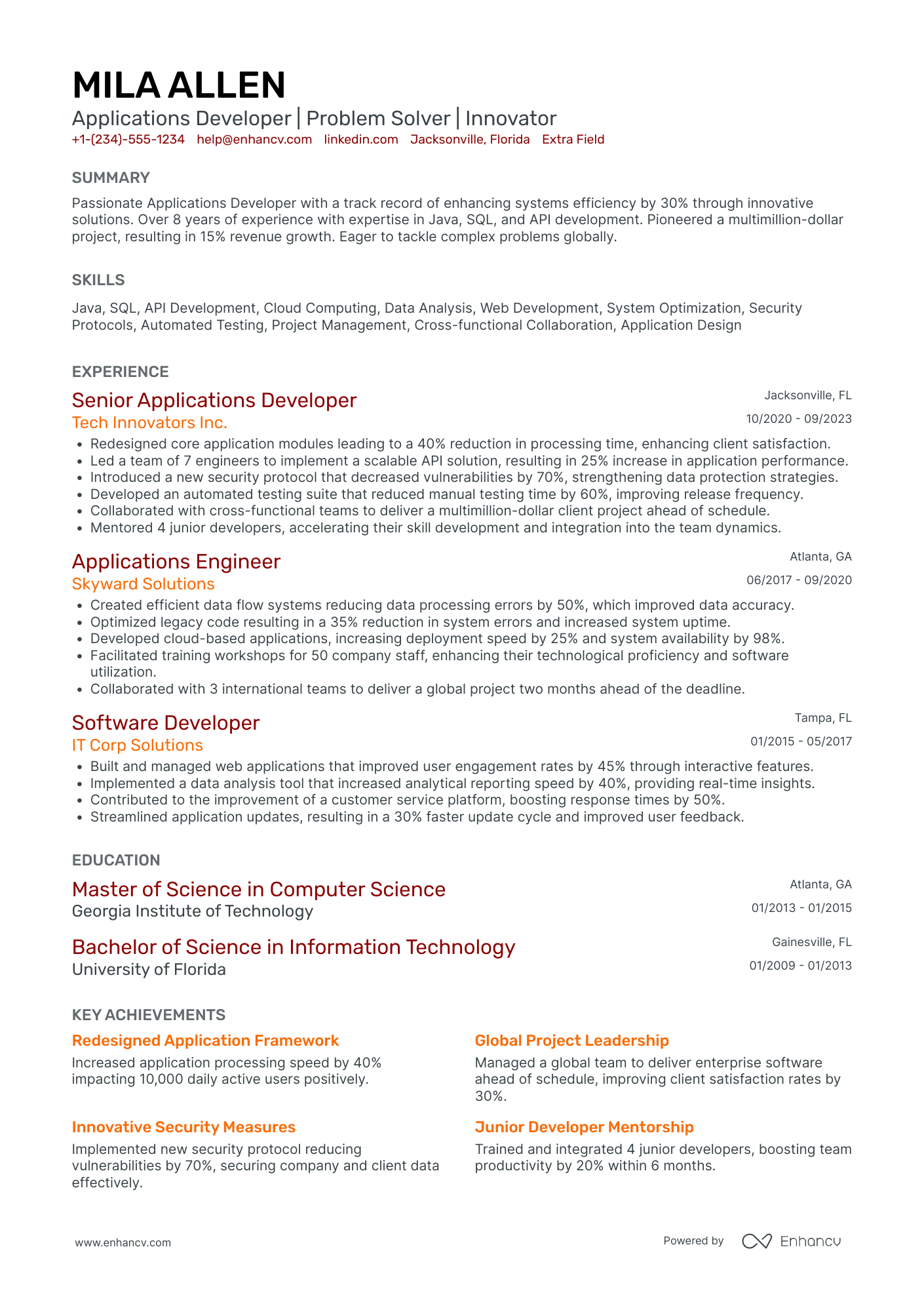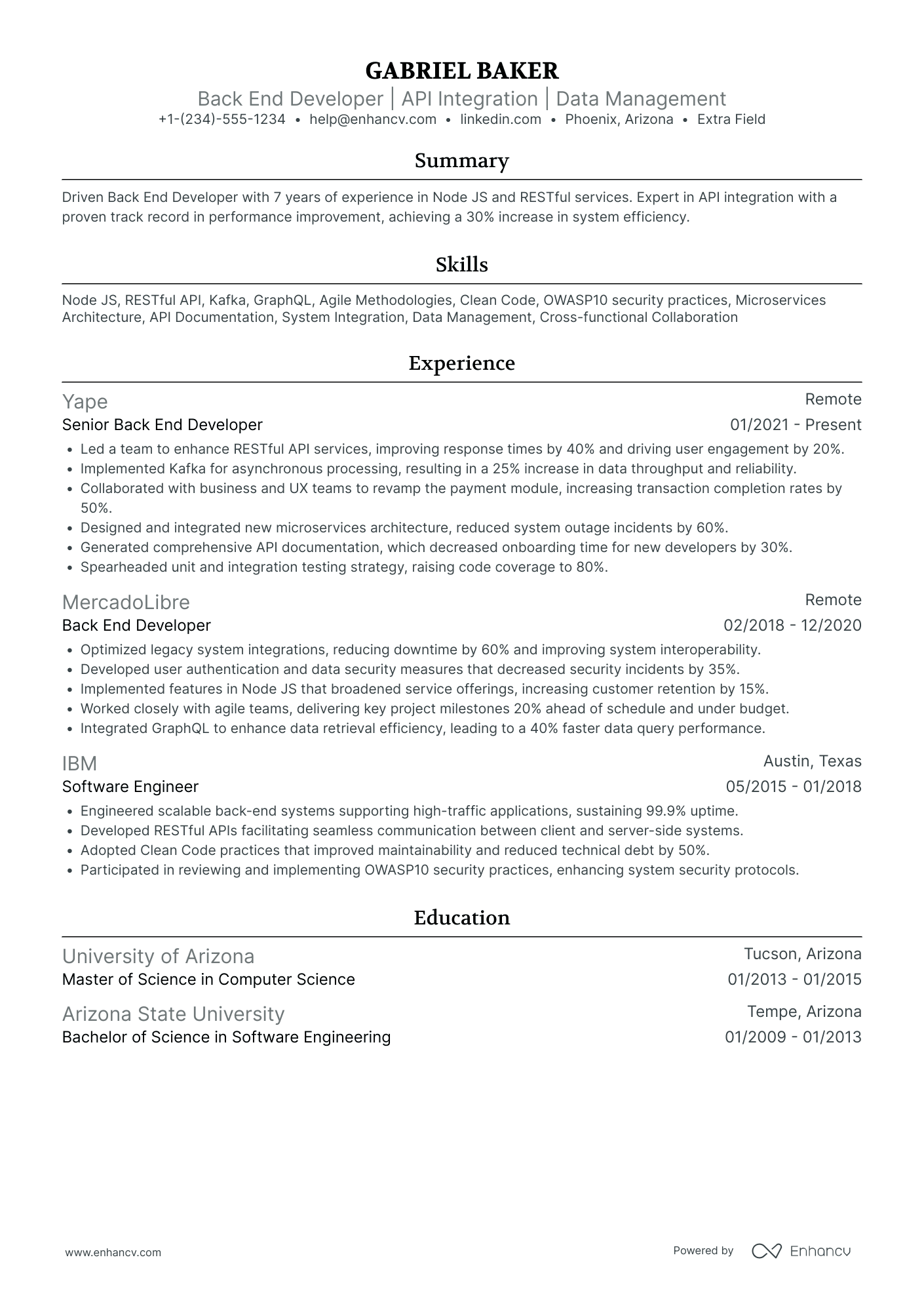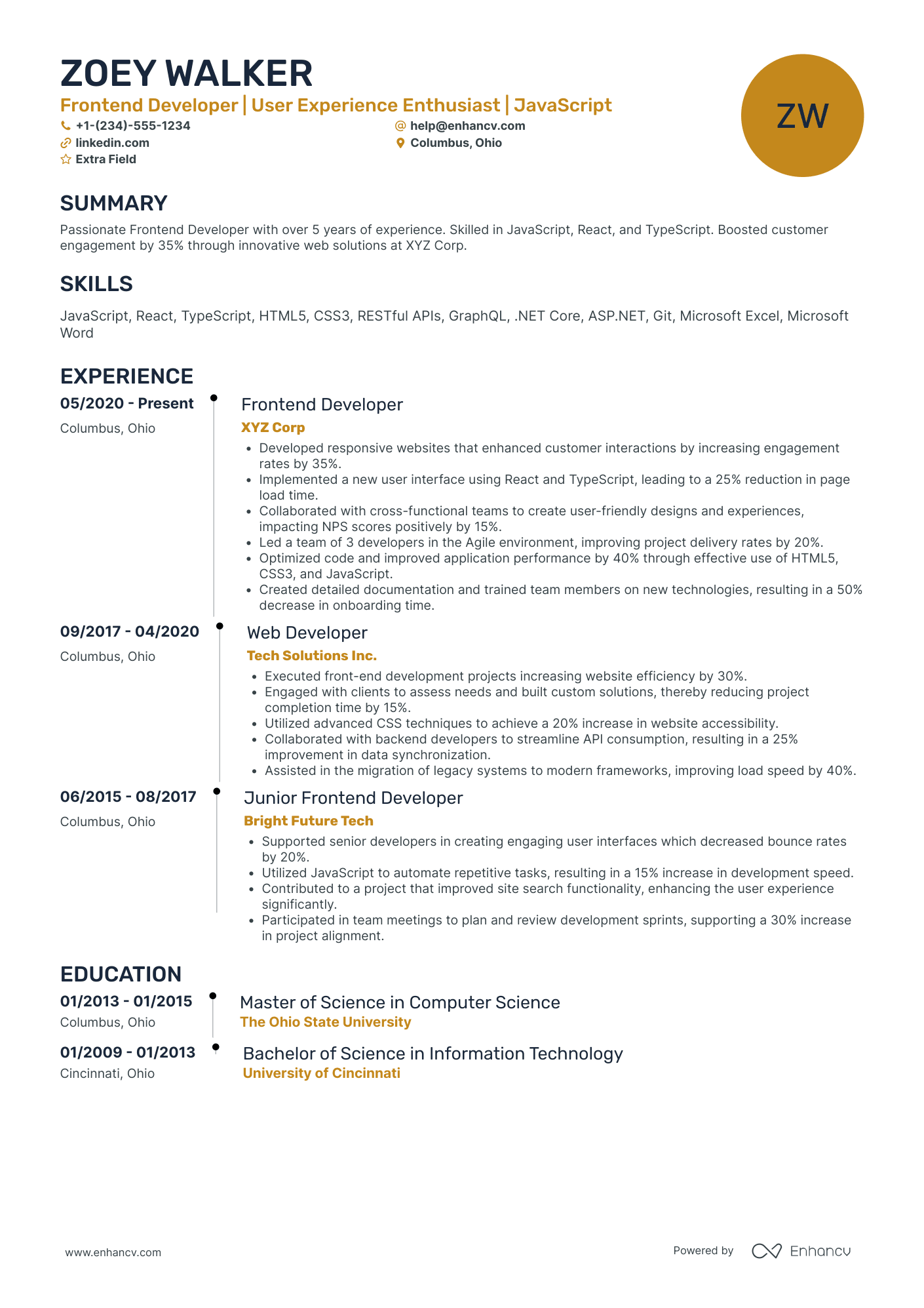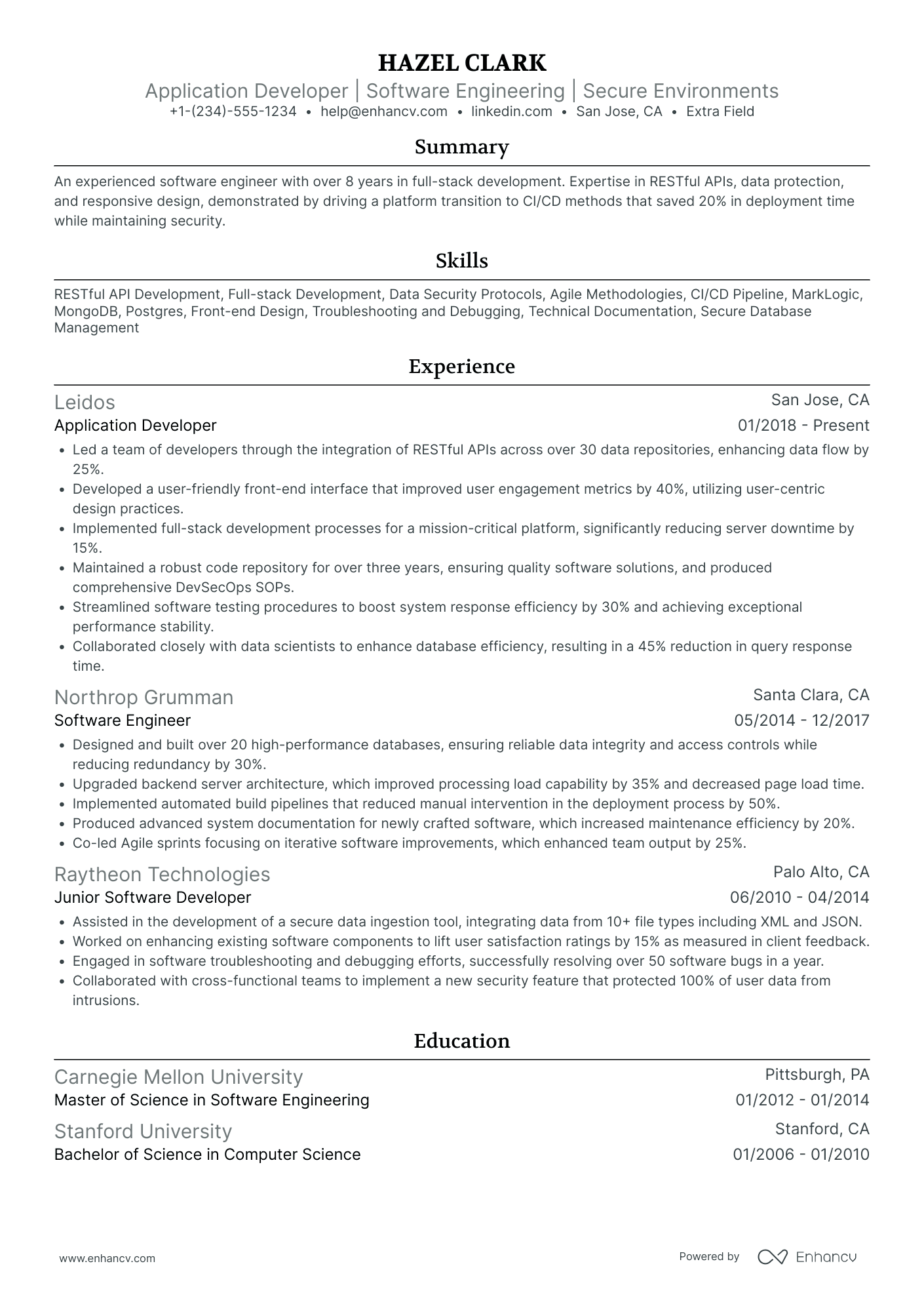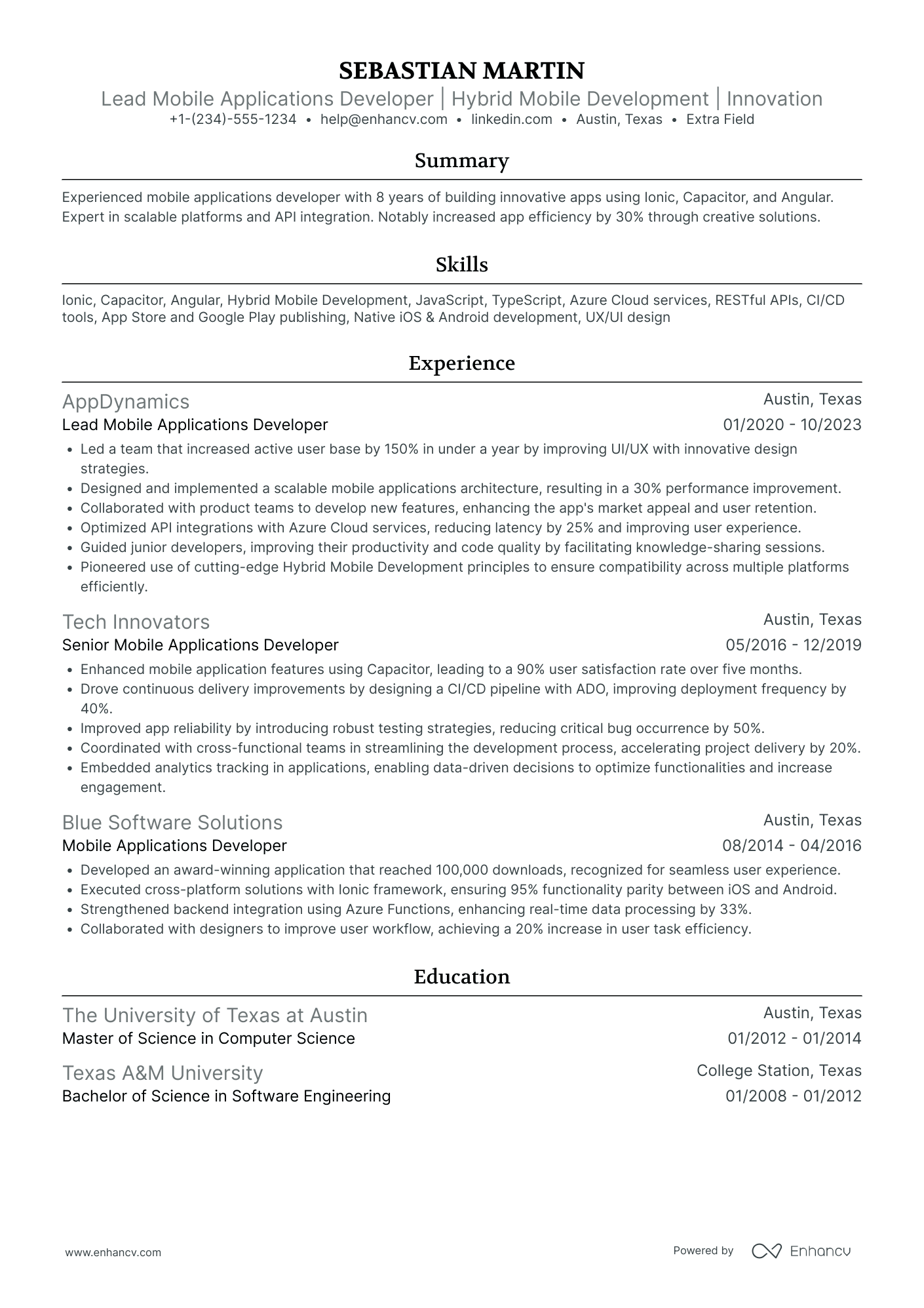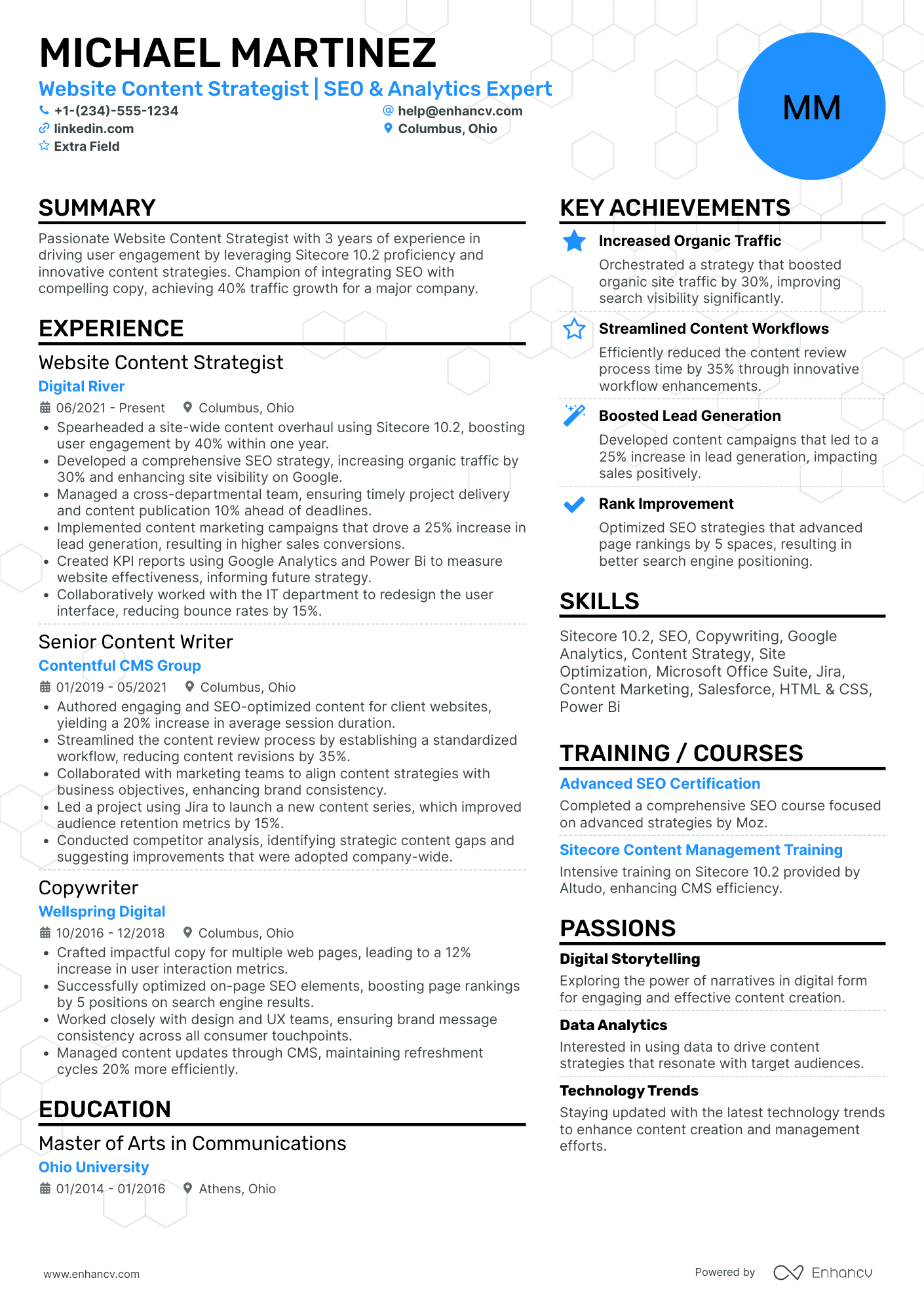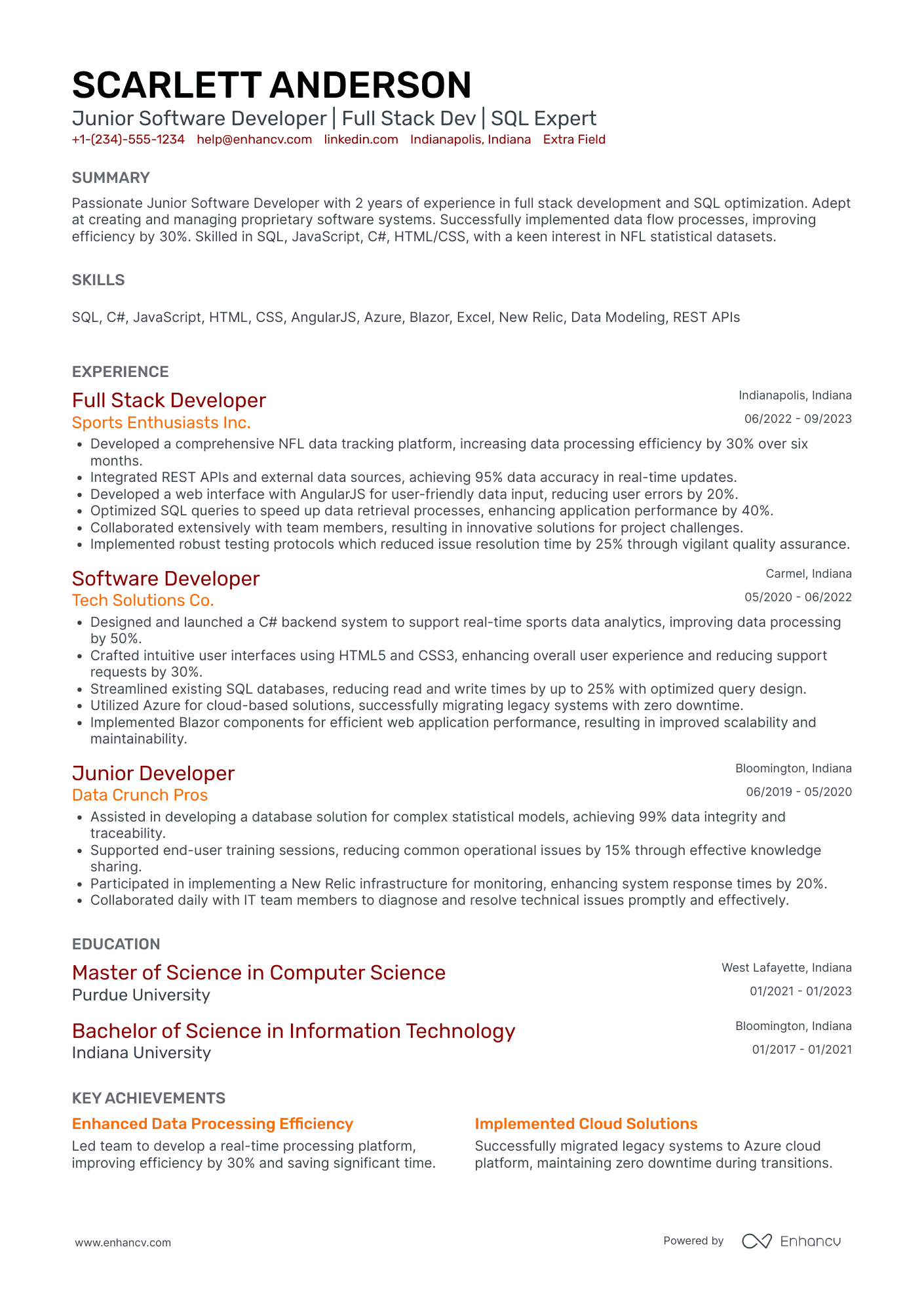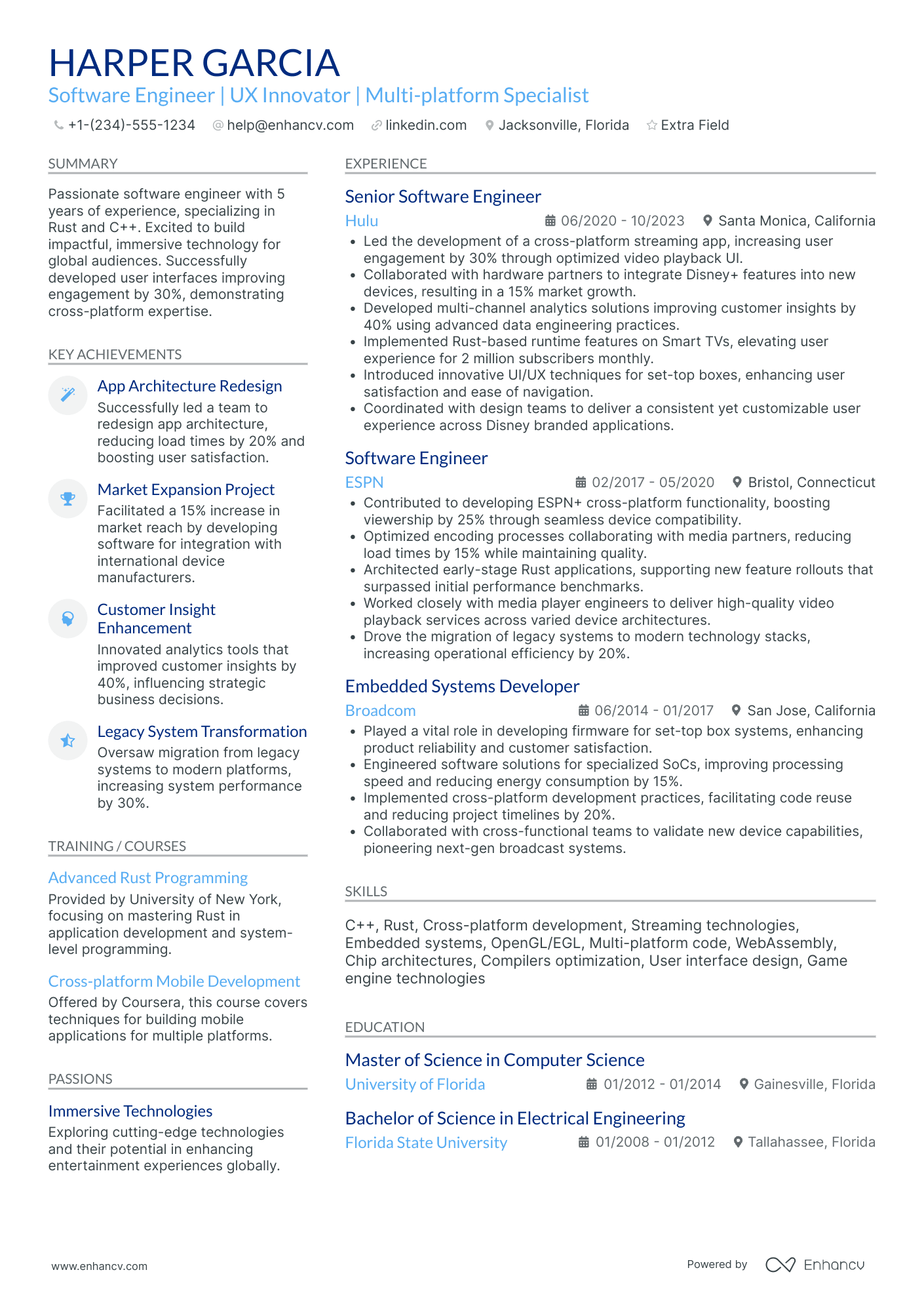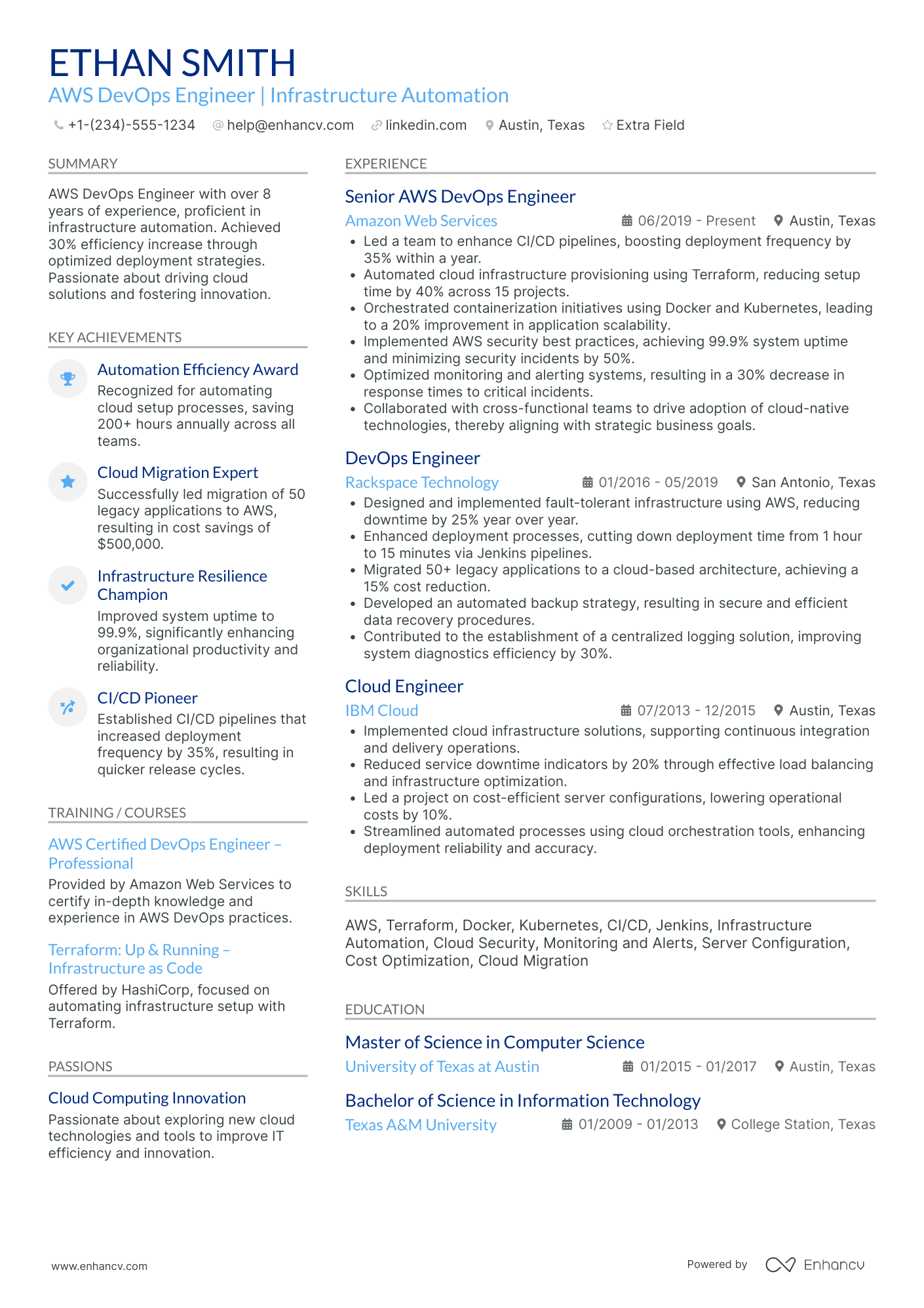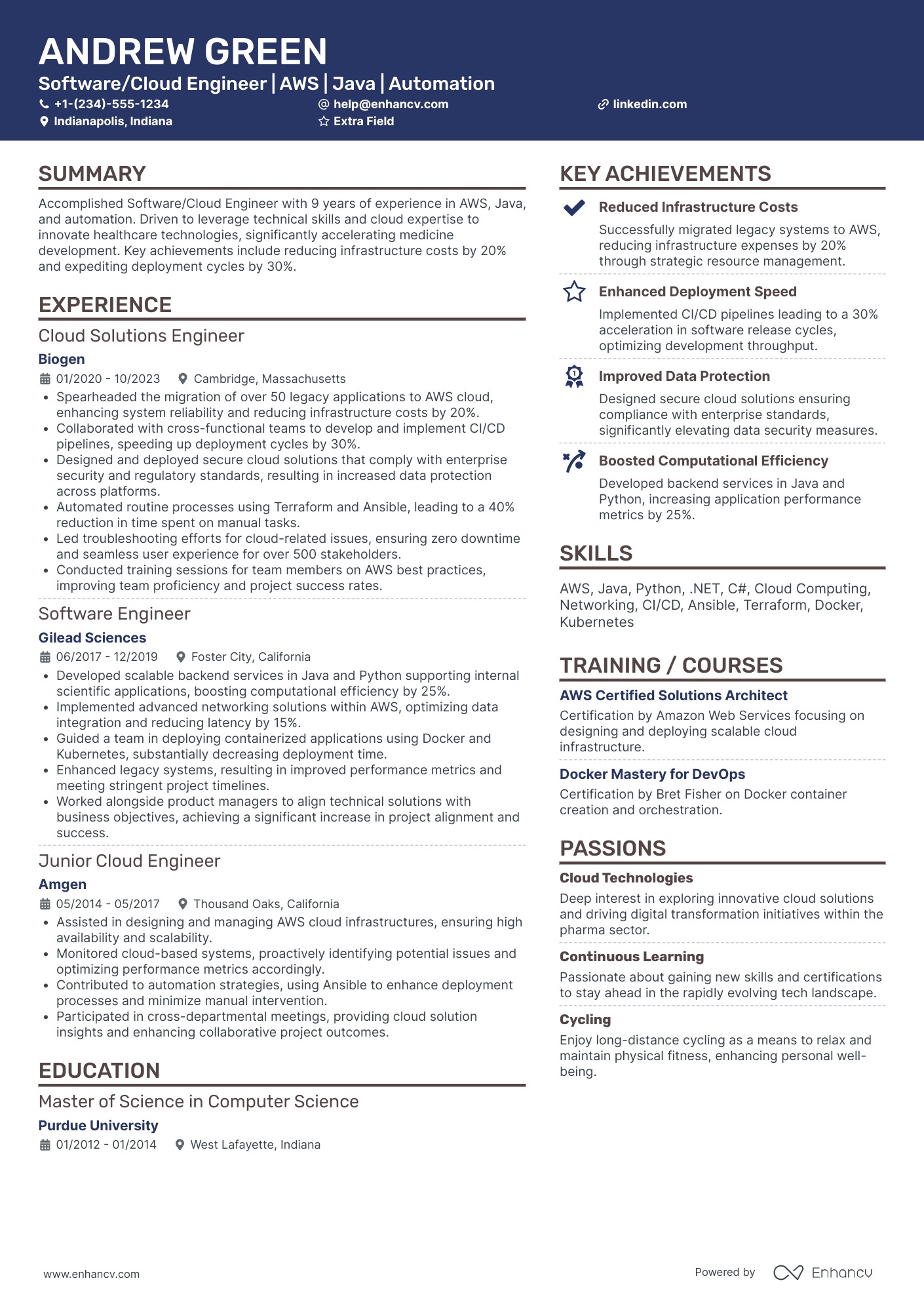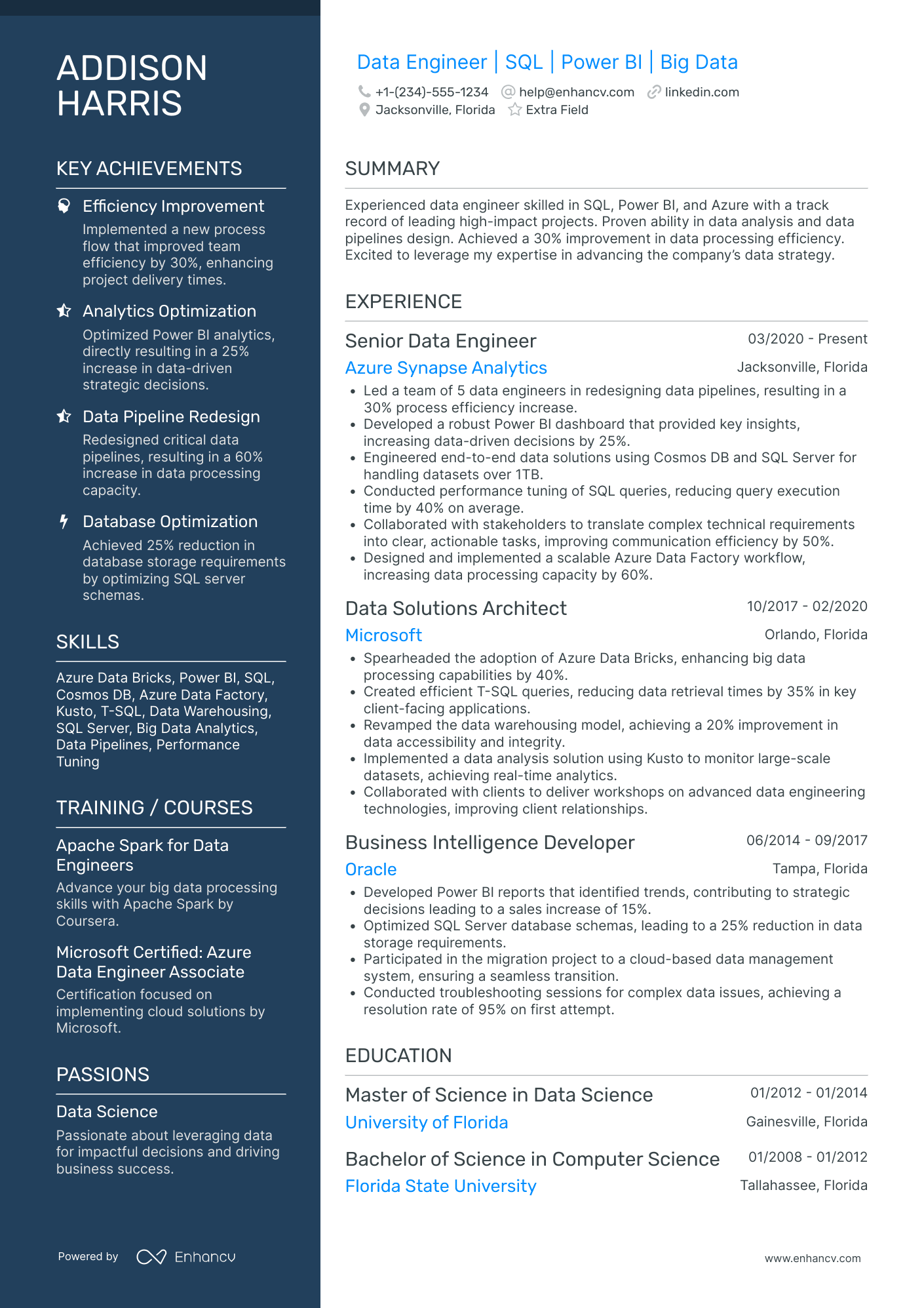Creating an entry-level software engineer resume is often one of the most challenging steps for those just starting in the field. With little experience and a competitive tech job market, candidates can increase their chances of success with a resume highlighting their unique strengths and readiness for the role.
To navigate this challenging landscape, it's essential to strategically outline your technical skills, academic projects, and any relevant experience. This guide will provide the necessary tools to create a compelling resume that effectively showcases your potential.
By focusing on key areas like your technical skills, academic projects, and any transferable experience, you show potential employers your readiness to succeed in the tech industry.
Key takeaways
- Include measurable outcomes in your projects and experiences to demonstrate real-world impact.
- Tailor your resume to the job description by highlighting relevant skills, tools, and technologies.
- Use a hybrid resume format to emphasize technical skills and projects while showcasing your education.
- Add certifications like AWS, Azure, or Kubernetes to validate your technical expertise.
- Feature additional sections like projects, hackathons, and open-source contributions to strengthen your profile.
- Keep your resume concise, well-structured, and focused on skills that align with entry-level software engineering roles.
To help you get started, let’s take a look at a detailed sample resume that demonstrates what success looks like.
Entry-level Software Engineer Resume Sample
Here’s an example of a strong entry-level software engineer resume tailored for aspiring engineers. It shows how to accentuate internships, education, and technical skills, even with limited professional experience, to be noticed by potential employers.
Christian Torres
Software Engineer | Agile Development | Embedded Systems
(210) 867-53XX | help@enhancv.com | @LinkedIn | San Antonio, TX
Summary
Enthusiastic software engineer with a solid foundation in coding, testing, and software development. Experienced in Agile environments and passionate about creating innovative solutions for complex challenges. Career aspirations include contributing to impactful projects in defense technology and advancing skills in embedded systems and software testing.
Experience
Software Engineering Intern
Lockheed Martin, Fort Worth, TX
May 2023 – August 2023
- Developed automated test scripts for embedded systems, reducing testing time by 35% and improving reliability.
- Collaborated with cross-functional teams to debug and optimize existing software, resulting in a 20% performance boost.
- Designed and implemented a tool for monitoring system performance, enhancing data accuracy by 15%.
- Participated in Agile ceremonies, contributing to sprint planning and backlog refinement for two major projects.
- Wrote technical documentation for software features, streamlining onboarding for future interns and team members.
- Created and maintained unit tests, achieving 95% code coverage across critical components of the project.
Software Development Intern
Raytheon Technologies, Dallas, TX
January 2023 – April 2023
- Contributed to the development of a user interface for mission-critical software, increasing usability by 30%.
- Enhanced the functionality of existing tools by integrating new APIs, resulting in improved data retrieval speed by 40%.
- Assisted in testing and debugging a secure communication protocol, ensuring compliance with industry standards.
- Conducted peer code reviews to maintain quality and consistency, reducing errors in production by 15%.
- Supported the deployment of a software update across 10 systems, ensuring a smooth transition with zero downtime.
Education
Bachelor of Science in Software Engineering
University of Texas at San Antonio
Graduated: 2023
- Coursework included software development lifecycle, object-oriented programming, and Agile methodologies.
- Gained expertise in embedded systems, software testing, and debugging techniques.
- Worked on a capstone project to develop a real-time data monitoring application, achieving 20% faster performance.
- Participated in collaborative programming projects to design and implement scalable software solutions.
Certifications
- Eggplant Functional Test Automation (Keysight Technologies) (2024)
- Advanced Embedded Systems (Coursera) (2025)
Skills
- Java
- Python
- Agile Development
- Embedded Systems
- Eggplant Test Automation
- Software Testing
Languages
- English (Native)
- Spanish (Proficiency: 4)
Now that you've seen a strong example of an entry-level software engineer resume, let's explore how to format your own resume to make it more professional, clear, and recruiter-friendly.
How to Format an Entry-level Software Engineer Resume
For aspiring software engineers, the resume layout and organization of your resume are key to making a great first impression.
Here’s how to design a resume that highlights your technical skills and potential.
Choose the right format
The hybrid resume format is ideal for entry-level software engineers. It emphasizes technical skills, personal or academic projects, and education—perfect for applicants with limited professional experience. In contrast, a chronological resume focuses on listing work experience starting with your most recent job first, making it suitable for those with a substantial professional background.
A functional resume emphasizes skills and achievements over job history, making it ideal for candidates with little experience. A combination resume integrates skills with a focus on education and projects.
Design and layout tips
Follow these design and layout tips to ensure your resume is both visually appealing and easy to read for recruiters and ATS (Applicant Tracking Systems):
- Margins: Use margins between 0.5" and 1" to avoid clutter while maximizing space.
- Colors: Stick to black text with one accent color (e.g., blue or gray) for headings or dividers to maintain a professional tone. Refrain from using more than three colors on your resume—primary, secondary, and accent.
- Fonts: Choose clean fonts like Arial, Rubik, or Calibri. Use 10-12 pt for the body and 14-16 pt for headers to enhance readability.
- Columns: Consider a two-column layout to list skills (e.g., Python, React, AWS) and certifications without overwhelming the page. Avoid overloading columns with too much detail, as it can hinder readability and ATS parsing.
- Length: Limit your resume to one page. Entry-level applicants should focus on the most impactful details.
Contact information
Include your contact info on your resume, such as your name, phone number, email address, GitHub, LinkedIn profile, or a portfolio showcasing relevant projects (e.g., a React web app or Python automation scripts).
ATS (Applicant Tracking Systems) can easily parse these details, so focus on clarity and avoid unnecessary elements like your full mailing address or a photo.Usually, photos aren’t required for US resumes. However, always check with the job ad to be sure.
ATS (Applicant Tracking Systems) often causes unnecessary fear. Our tests show that fonts, colors, columns, and resume length don’t affect parsing. Focus on matching job description language and formatting like dates and bullet points, as these may affect your application. Not all companies use ATS, so avoid keyword stuffing and keep your resume clear and concise.
File formatting and naming
Proper file formatting and naming can make your resume more professional and easier for recruiters to manage:
- Save your resume as a PDF unless the employer specifies otherwise to ensure it looks consistent on any device.
- Use a simple, professional file name: FirstName_LastName_Resume.pdf
Key resume sections for software engineers
These key resume sections are essential for presenting your qualifications and making a strong impression as an entry-level software engineer:
- Contact Information: Make it easy for recruiters to reach you.
- Professional Summary or Objective: Highlight programming skills, project experience, and your enthusiasm for solving technical challenges.
- Technical Skills: Focus on programming languages (e.g., Python, JavaScript), tools (e.g., Git, Docker), and relevant technologies.
- Projects: Feature personal or academic projects drawing attention to your ability to build applications, automate processes, or solve problems.
- Education: Include your degree, relevant coursework, and honors or GPA on your resume (if 3.5 or above).
- Certifications: List certifications like AWS, Microsoft Azure, or relevant online courses.
Got a resume already? See how well it performs against our AI resume checker!
Is your resume good enough?
Drop your resume here or choose a file. PDF & DOCX only. Max 2MB file size.
Now that you’ve formatted your resume and outlined its key sections, let’s focus on writing an experience section that effectively demonstrates your skills and contributions.
How to List Your Entry-level Software Engineer Resume Experience
When you’re starting out, your experience section should focus on practical applications of your skills. Even without formal work experience, you can demonstrate academic and personal projects, as well as internships that demonstrate your abilities.
What to include in the experience section
- Internships or volunteer work:Highlight any internships or volunteer roles where you applied your coding skills, even if the projects were small.
- Academic projects: Mention coursework that demonstrates your programming skills or understanding of concepts like databases, algorithms, or software development.
- Personal projects: Include independent projects that show initiative, such as building an app, website, or automation tool.
- Hackathons or competitions: List hackathons or coding competitions that require teamwork and creative problem-solving under deadlines.
- Freelance or open-source contributions: Add freelance work, if applicable, or contributions to open-source projects that demonstrate your ability to collaborate and deliver results.
Why tailoring your resume matters
Tailoring your resume to the specific job description helps you stand out in a competitive market.
Here’s why it’s essential:
- Relevance: It shows recruiters that your skills align with the role.
- ATS optimization: Tailoring ensures your resume includes the right keywords to pass ATS screening.
- Professionalism: It demonstrates that you’ve taken the time to research the position and present yourself as a strong fit.
PRO TIP
Identify key skills and tools from the job description and incorporate them into your experience section. For example, if the role emphasizes cloud computing, mention any experience with AWS or similar platforms.
Let's examine a real-world job ad and identify the parts we'll focus on in the sample experience entry below.
Entry-Level Software Engineer
About the role:
As an entry-level software engineer, you will be responsible for designing, developing, and maintaining software applications while working in an agile environment. You’ll collaborate with cross-functional teams, troubleshoot technical issues, and implement efficient solutions. This role focuses on contributing to the development of scalable systems and ensuring the quality and performance of software through code reviews and debugging.
Responsibilities:
- Collaborate in an agile environment to design, develop, test, and maintain innovative software applications.
- Assist in resolving network issues, configuring operating systems, and providing remote desktop support.
- Troubleshoot complex problems, gather requirements, and implement creative solutions across various industries.
- Participate in code reviews, debugging, and performance optimization to deliver high-quality software solutions.
- Contribute to the development of scalable backend services to support secure and efficient operations for millions of users.
Requirements:
- Bachelor’s degree in Computer Science, Computer Engineering, or a related field.
- Proficiency in programming languages like Java, Python, or C++.
- Experience with databases (e.g., SQL) and a strong understanding of algorithms and data structures.
- Strong problem-solving skills and the ability to work collaboratively in team settings.
- Excellent verbal and written communication skills.
- Familiarity with software development methodologies like Agile or Scrum.
- Ability to analyze and improve efficiency, scalability, and stability of various systems.
How to tailor and write a work experience section
A targeted experience section ensures your resume aligns with the specific job description, emphasizing the skills, tools, and accomplishments recruiters value most.
Here's how to structure and present your experience to the job posting above:
Key components of a work experience entry
- Position title: Clearly state your current role in the resume header, such as “Software Engineer Intern,” or write the role the company is looking for, in this case, “Entry-Level Software Engineer.”
- Workplace: Include the organization or project name (e.g., “TechStart Inc.” or “Open Source Contribution”).
- Location: If applicable, add the city and state or indicate "Remote".
- Date range: Provide accurate dates, including the year, and note if the position is ongoing.
- Bullets: Briefly describe your responsibilities, skills used, and quantifiable achievements in each role using action verbs.
Getting the most out of the bullets
- Focus on collaborative work in agile environments, highlighting teamwork and iterative development.
- Include technical skills and tools you used (e.g., React, Python, SQL, Node.js).
- Quantify results whenever possible (e.g., "improved database query efficiency by 15%").
- Showcase problem-solving skills, such as debugging or optimizing performance.
- Highlight contributions to code quality, like participating in code reviews or identifying and resolving bugs.
Here’s what it could look like:
- •Collaborated in an agile environment to design and test a web-based inventory management system using React and Node.js.
- •Optimized SQL database queries, reducing system latency by 15% and improving application responsiveness.
- •Participated in code reviews, identifying and resolving 20+ bugs to enhance software performance and maintainability.
Here’s how the above experience entry was tailored to the job description:
- Aligned with the job requirements: Demonstrated teamwork in an agile environment and applied technical skills like React, Node.js, and SQL to meet key responsibilities.
- Showcased problem-solving and code quality: Improved database efficiency by 15% and resolved 20+ bugs through code reviews and debugging.
- Quantified contributions:Used measurable outcomes to highlight the impact, such as reducing system latency and enhancing software performance.
Now that you’ve seen how entry-level candidates can align their experience with a job description, let’s explore how to quantify achievements to make a resume even more impactful.
How to quantify your experience on a resume
For entry-level software engineers, quantifying your achievements helps present the value of your work, even without an extensive job history. Use metrics from internships, class projects, or personal work, such as "improved algorithm efficiency by 20%" or "built a web app used by 50+ peers," to demonstrate your potential impact.
Here are some ideas on adding measurable impact to your resume:
- Add performance metrics from academic or personal projects, such as reduced algorithm runtime by a percentage or improved application load time.
- Include specific user engagement data for applications you’ve developed, like the number of users who interacted with your app or feature.
- Mention the size or complexity of data sets you analyzed or processed, such as handling millions of rows in a database query.
- Highlight the impact of your code optimizations by referencing reduced system errors, downtime, or resource consumption.
- Quantify contributions to group projects, such as the number of features you implemented or the lines of code you reviewed.
Even without formal experience, you can create a strong entry-level software engineer resume by focusing on the skills, projects, and achievements that showcase your potential. Learn more about what makes a good resume.
Writing an entry-level resume objective
Resume objectives are ideal for entry-level applicants—they’re concise (1–3 sentences) and focus on the skills, goals, and value you bring to the role. Unlike summaries, which are longer and suited for experienced candidates, objectives highlight how your background aligns with the company’s needs.
Use these tips to craft a strong objective:
Tips for writing objectives
- Make it specific: Tailor the objective to the job description, mentioning the company and relevant technologies. Avoid generic statements.
- Demonstrate your value: Highlight how your skills solve problems or contribute to team success, aligning with the company’s goals.
- Keep it concise: Write 1–2 impactful sentences with clear, direct language.
- Include technical skills: Mention relevant tools and languages like React, Python, or AWS that match the job requirements.
- Show enthusiasm: Express excitement about contributing to the company and demonstrate a willingness to learn and grow.
Here’s a concise example of an entry-level software engineer objective that demonstrates technical skills, education, and career goals.
With your objective in place, the next step is to present your hard and soft skills, reflecting your technical expertise and collaborative abilities.
How to List Your Hard and Soft Skills on Your Resume
Skills are a critical part of an entry-level software engineer resume because they highlight your technical proficiency (hard skills) and your ability to collaborate and adapt (soft skills). Recruiters look at these sections to quickly determine if you possess the qualifications and mindset needed for the role.
Hard vs. soft skills
Hard skills: These are measurable, technical abilities directly related to the role, such as coding languages, tools, and frameworks.
Soft skills: These are interpersonal or personal attributes, like communication and problem-solving, which enable you to work with others and handle challenges.
Where to list skills
- Dedicated skills section: Place your technical hard skills in a skills section for easy scanning.
- Work experience and projects: Incorporate soft and hard skills naturally into bullet points to show how you’ve applied them.
These technical skills are essential for entry-level software engineers, as they demonstrate your ability to work with programming languages, tools, and frameworks required to build and maintain software systems.
Best hard skills for your entry-level software engineer resume
- Python
- Java
- JavaScript
- React
- Node.js
- SQL
- Git/GitHub
- Docker
- AWS (Amazon Web Services)
- Kubernetes
- HTML/CSS
- C++
- RESTful APIs
- Agile/Scrum methodologies
- Bash/Shell scripting
- Data Structures
- Algorithms
- MongoDB
- Testing tools (e.g., Selenium, JUnit)
- CI/CD pipelines
Soft skills are equally important because they highlight your ability to collaborate, communicate, and adapt to dynamic work environments, making you a valuable team player.
Best soft skills for your entry-level software engineer resume
- Problem-solving
- Communication
- Team collaboration
- Adaptability
- Time management
- Critical thinking
- Creativity
- Initiative
- Accountability
- Attention to detail
- Openness to feedback
- Resilience
- Emotional intelligence
- Leadership potential
- Multitasking
- Conflict resolution
- Empathy
- Decision-making
- Work ethic
- Organization
These skills will make your resume more impactful and help you stand out to recruiters as a well-rounded candidate.
How to List Your Certifications and Education on Your Resume
The education section on your resume plays a critical role in any entry-level software engineer resume. It highlights your academic qualifications, technical foundation, and any coursework relevant to the role. Recruiters rely on this section to quickly evaluate whether your background aligns with the job requirements.
In entry-level resumes, the education section can be placed above the experience section, especially if there’s little to no practical experience to showcase.
Best practices for listing education and certifications:
- Include your degree, along with your major and minor, and relevant coursework (e.g., Data Structures, Algorithms, Software Development).
- Add academic achievements, such as a high GPA (if it’s 3.5 or above).
- List certifications (e.g., AWS Certified Developer) or relevant online courses (e.g., Coursera, Udemy, Codecademy) to show initiative.
If your degree is incomplete or you're still working on certifications, you can present your efforts and technical abilities effectively.
If you’re still working toward certifications or have an incomplete degree on your resume, include completed coursework or personal projects that demonstrate your initiative and technical ability.
Here’s an example of a well-crafted education entry tailored to the job description we discussed above:
- •Relevant coursework: Algorithms, Data Structures, Artificial Intelligence, Software Development
- •Dean’s List (2023, 2024)
Here's why it works:
- Clear and relevant details: The degree, university name, location, and GPA (3.8) are presented concisely, making it easy for recruiters to evaluate academic qualifications.
- Targeted coursework and achievements: Listing courses like Algorithms and Artificial Intelligence, along with Dean’s List honors, highlights technical skills and consistent academic success.
- Concise formatting:The structured layout ensures the section is easy to read and directly relevant to the role.
Include certifications on your resume that validate your proficiency in key technologies and tools to demonstrate your readiness for entry-level software engineering roles. For example, certifications in AWS or Kubernetes validate proficiency in cloud-based infrastructure development.
Add these to your resume to strengthen it further:
Best certifications for your entry-level software engineer resume
Once you’ve nailed the core sections of your resume, adding optional ones can further demonstrate your skills and make your application stand out.
Additional Sections for An Entry-Level Software Engineer Resume
Use additional sections to tell a well-rounded story. For example, link to a GitHub repository in your open-source contributions or describe how a volunteer project solved a real-world problem. These achievements can set you apart and make your resume more memorable.
- Projects: Underline technical projects you’ve completed, with tools and technologies used.
- Awards: Present any awards you’ve received to demonstrate your creativity, dedication, and ability to excel under pressure. Learn how awards can impress recruiters.
- Open-source contributions: List contributions to GitHub repositories or other open-source projects to reflect collaboration and coding experience.
- Volunteer experience: Draw attention to volunteer work where you applied technical skills, such as building a nonprofit website or automating a process.
In Conclusion
This article is a comprehensive guide for crafting an impactful entry-level software engineer resume, focusing on tailoring each section to highlight skills, projects, and certifications that resonate with recruiters.
From structuring your education and experience to leveraging additional sections like certifications and projects, this guide ensures your resume stands out, even without formal work experience.
Entry-Level Software Engineer resume examples
By Experience
Junior Software Engineer
Software Engineer Trainee
Graduate Software Engineer
By Role
